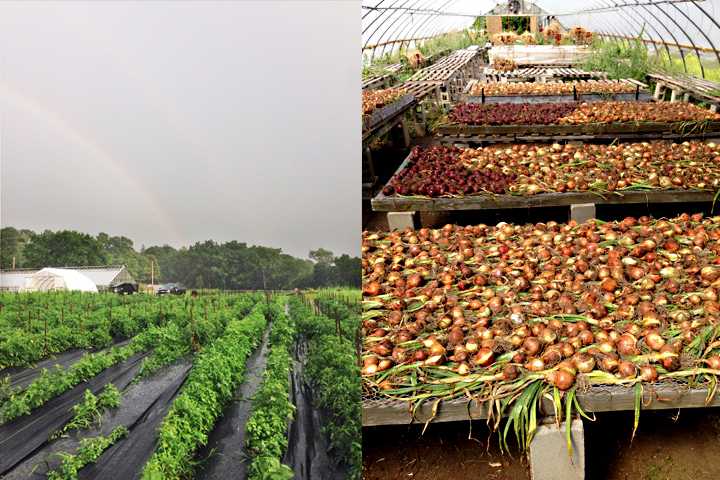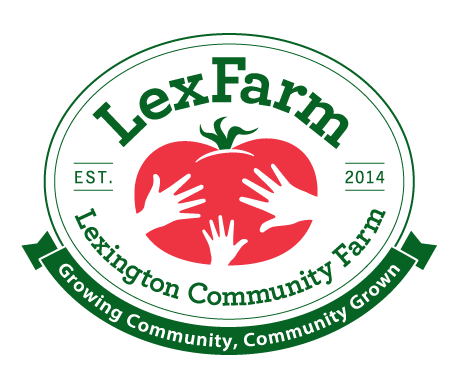End of Season Report

This summer season we truly hit our stride in the fields thanks to several staff returning, a supportive customer-base, sold out vegetable and flower CSA memberships, and favorable growing conditions. With a hard-working crew, an enthusiastic group of work-for-shares, and many devoted volunteers, we reached many milestones, including:
- receiving organic certification in May
- increasing our production by about 25%
- distributing nearly $700 value of veggies in your $600 20 week share and $150 in your $100 flower share
- taking great joy in watching you pick abundant PYO crops
- continuing our transition from a volunteer-led to a sustainably staff-led organization
- meeting our ambitious budgetary goals for farm production
- and planting our first permanent roots in the ground—a healthy stock of perennial herbs and flowers.
Growing Season: Weather, Plant Diseases and Pests
By mid-May 2017, we had officially rebounded from last year’s drought. The 2017 growing season brought a healthy amount of rainfall, a hot May, cold June, and cool summer nights. Overall, we were relieved to have generally favorable growing conditions.
The warm early spring days yielded an abundance of broccolini for the first three weeks of your share. The plentiful rain in spring gave our allium (onions, scallions, leeks, and garlic) field a healthy start, resulting in fresh or stored onions almost every week of the CSA season. A few cold nights in early June almost knocked out our Italian eggplant, making it susceptible to flea beetle damage. The cool nights in July and August slowed the ripening of heat-loving crops like watermelons and sweet potatoes, but provided plentiful greens through the end of the CSA share. The fact that we grow over 40 varieties of crops ensures that conditions will always favor something—a great insurance policy.
The rain allowed us to irrigate crops primarily to promote steady growth, rather than to simply save crops. Our entire staff was trained in setting up drip irrigation this year, empowering all hands to pitch in during a somewhat dry July and August.
Though grateful for the rain, we wouldn’t be farmers without complaining about the weather, and rain does bring challenges. Moist conditions allow plant disease to spread, some pest populations to thrive, and weed seeds to germinate more frequently. Fortunately, we took time on our weekly field walks to diagnose diseases, pests, and especially weedy areas. We anticipated and budgeted for many of the tools we use to address these challenges, allowing us to purchase necessary solutions before the season even began.
Last year no cases of late blight, a fungal disease that quickly terminates tomatoes and potatoes, were reported in Massachusetts. This year the disease was first reported in Massachusetts in July. As a result, Tim stayed late at the farm several nights, spraying tomatoes with an organic-approved copper to prevent them from succumbing to late blight. And it worked! You received an abundance of tomatoes this year, right through the 19th week of the CSA!
The final challenge of rain was the abundance of weeds. We were determined to cut down our weed pressure this year, while avoiding black plastic when possible. You may have noticed more straw mulch and black woven landscape fabric in our fields—alternatives that add organic matter or allow water to permeate into our soil.
Staff
In his third year at LexFarm, Farm Manager Tim Hines took on new administrative tasks to help transition work being done by volunteers and board members to paid staff. He and board members spent time on organization development, educational programming, and community outreach to pave the way for programs in 2018 and beyond. This year, he relished time spent in the fields during harvest mornings, but the vast majority of field work was led by the rest of our crew.
In her second year at LexFarm, Elena Colman became the Production Manager, and led the day-to-day crop and seedling production of the farm. She wrote the season’s crop and fertility plan, monitored field conditions and balanced the work of planting, harvesting, and weeding to ensure a bounty of vegetables were available for the CSA and farm stand. In the spring and fall she worked with board Vice President Amanda Maltais to organize the first annual Spring Festival and the fourth annual Harvest Fest.
In their second seasons at LexFarm, Sam Freedman and Micah Wilson split the role of Assistant Grower. They led the harvest crew and helped in every aspect of production from greenhouse work to planting to weeding and harvesting. Emily Olick Llano and BreAnne Wroughton split the role of Distribution Leader. They kept the CSA distribution and stand running smoothly, and helped out in the fields whenever able. Emily, BreAnne, and Micah’s staffing of the farm stand allowed Tim and Elena to spend more time doing field work, record-keeping, and administrative tasks. Everyone learned how to drive the new tractor, a testament to the capability, increased responsibilities, and trust we had in our crew!
In order to plant, weed, and harvest CSA crops between May and October, it’s important to have enough crew on hand. The addition of our spring Prebuy Seedling Sale and the expansion of our Fall Bulk Sale allowed us to extend our seasonal production, and also offered longer, more meaningful employment to our seasonal crew.
Due to increased production for our CSA, we expanded our work-for-share program, in which volunteers commit to helping one day per week during the CSA season in exchange for a vegetable and flower CSA share. This year we had a wonderful crew of eight work shares. Four of them helped during CSA distribution in the farm stand, and four helped harvest in the fields. We couldn’t have gotten through the season without them, and we are incredibly grateful for their hard work, high spirits, and good humor.
This season we managed to produce and harvest for our 200 member CSA, busy farm stand, seedling sale, and fall bulk sale with 3 full-time crew members in the field. We are looking forward to employing a larger crew in 2018, which will allow us to do even more at the farm. We are hoping to start a compost program, plant more perennial crops, spend more time educating staff, and address farm borders, roads, and common spaces.


